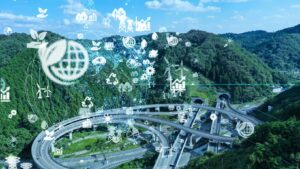As the world grapples with climate change and rapid urbanization, the concept of sustainable cities has moved from a visionary idea to a critical global goal. These future-focused urban environments are designed to balance economic, social, and environmental needs, ensuring a resilient, thriving community for generations to come. They’re not just about reducing carbon footprints or enhancing green spaces but are a holistic approach to redefining urban living.
Sustainable Cities of the Future
Key Characteristics of Sustainability
 Sustainable cities integrate features that promote environmental, economic, and social health. These characteristics include:
Sustainable cities integrate features that promote environmental, economic, and social health. These characteristics include:
- Renewable Energy Adoption: Cities tap into solar, wind, and hydroelectric power sources, reducing dependence on fossil fuels.
- Efficient Transport Systems: Innovations like electric buses, cycling paths, and car-sharing reduce carbon footprints.
- Waste Management Solutions: Advanced recycling and waste-to-energy systems minimize landfill use and turn waste into resources.
- Green Building Standards: Structures comply with energy-efficient codes and use sustainable materials.
- Water Conservation Measures: Systems for rainwater harvesting and wastewater recycling ensure sustainable water use.
- Increased Green Spaces: Parks and green roofs offer both ecological benefits and improve residents’ well-being.
Technological Innovations Shaping Sustainable Cities
Renewable Energy Sources
 Renewable energy sources stand as central pillars in the development of sustainable cities of the future. Solar panels, wind turbines, and biogas plants are increasingly common features in urban settings, converting natural resources into clean power. Cities utilize these technologies to decrease dependence on fossil fuels and reduce greenhouse gas emissions. For instance, solar panels installed on building rooftiles harness sunlight to produce electricity, while wind turbines positioned in urban or peri-urban areas generate power from wind.
Renewable energy sources stand as central pillars in the development of sustainable cities of the future. Solar panels, wind turbines, and biogas plants are increasingly common features in urban settings, converting natural resources into clean power. Cities utilize these technologies to decrease dependence on fossil fuels and reduce greenhouse gas emissions. For instance, solar panels installed on building rooftiles harness sunlight to produce electricity, while wind turbines positioned in urban or peri-urban areas generate power from wind.
Municipalities are also exploring innovative feed-in tariff systems, rewarding residents and businesses for generating their own electricity and contributing excess power back to the grid. Moreover, advancements in renewable technologies have led to more efficient energy storage solutions, ensuring a consistent power supply even when solar and wind conditions are not optimal.
Smart City Technologies
Smart city technologies are crucial in enhancing urban efficiency and sustainability. They integrate Information and Communication Technology (ICT) into city infrastructure to manage urban flows and allow for real-time responses to challenges. Key applications include:
- Smart Grids: These electricity supply networks detect and react to changes in usage and generation, improving the efficiency of energy distribution and significantly reducing energy losses.
- Intelligent Transport Systems: They optimize traffic flow through real-time data analytics, reducing congestion and pollutant emissions. Features like smart traffic lights and real-time journey planning apps help smooth transportation across the city.
- Capture of potential sink areas: Photocell properties adapt electricity output throughout the day to optimize charge usage, thus minimizing waste in energy consumption.
In addition, smart sensors deployed across urban areas monitor parameters such as air quality, noise levels, and water usage, feeding data into integrated management systems. This helps not only in promptly addressing urban challenges but also in planning future city developments that adhere to sustainability goals.
Policy and Governance in Sustainable Urban Development
 Effective policy-making and governance structures form the backbone of sustainable urban development. Cities committed to sustainability implement policies that ensure the integration of renewable energy systems, efficient waste management, and sustainable transportation options, contributing to the realization of “sustainable cities of the future.” Governance in these cities facilitates coordinated actions across various sectors, enabling the effective use of smart technologies and resource management strategies. By aligning policies with innovative technologies, urban leaders drive significant advancements in sustainability, setting a compelling example for cities worldwide. In this respect, policies not only guide developmental efforts but also ensure that these efforts adhere to sustainability principles, reinforcing a city’s commitment to a balanced and inclusive urban future.
Effective policy-making and governance structures form the backbone of sustainable urban development. Cities committed to sustainability implement policies that ensure the integration of renewable energy systems, efficient waste management, and sustainable transportation options, contributing to the realization of “sustainable cities of the future.” Governance in these cities facilitates coordinated actions across various sectors, enabling the effective use of smart technologies and resource management strategies. By aligning policies with innovative technologies, urban leaders drive significant advancements in sustainability, setting a compelling example for cities worldwide. In this respect, policies not only guide developmental efforts but also ensure that these efforts adhere to sustainability principles, reinforcing a city’s commitment to a balanced and inclusive urban future.
Challenges Facing Sustainable Urban Development
As cities worldwide strive to become more sustainable they face numerous challenges. Yet the ongoing commitment to innovation and comprehensive urban planning offers a beacon of hope. Cities that prioritize sustainability not only enhance their resilience but also improve the quality of life for their residents. By continuing to implement and refine policies that foster environmental care economic stability and social inclusivity these urban areas set a standard for the future. The journey towards sustainability is complex but with persistent efforts and collaborative governance the vision of truly sustainable cities can become a reality. This progress is crucial not just for the cities themselves but for the global community as a whole.